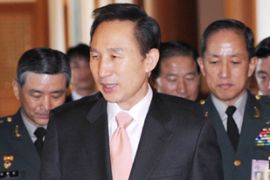Pyonyang suspends S Korea talks
North’s move comes as cross-border tensions mount in ongoing war of words.

North-South dialogue
“The South’s military authorities … will never avoid responsibility for suspending all North-South dialogue and blocking the [border] passage,” KCNA said.
| Escalating tensions |
|
February 25 Lee Myung-bak takes office as South Korean president. Promises to end unconditional aid to North, saying Pyongyang must improve human rights and return Southerners held since the 1950-53 Korean War
March 26 South Korean military chief tells MPs military will strike suspected nuclear weapons site in North if Pyongyang attempts to attack South with atomic bombs
South Korean foreign ministry says it will back a UN resolution condemning North’s human rights record, ending a decade of reluctance by previous administrations
March 27 Pyongyang expels South Koreans working at joint industrial zone in the North
March 28 North Korea test-fires missiles into sea and warns it will “mercilessly wipe out” any South Korean warships that violate its waters
March 29 North warns inter-Korean reconciliation may be in jeopardy, implements ban on South Korean officials entering the country
March 31 North Korea threatens to turn the South to “ashes” after South’s warning of pre-emptive strike in response to nuclear attack
April 1 North accuses South Korean president of being US stooge and causing instability on peninsula
April 2 South’s defence ministry tells North to stop verbal attacks in first official response
See also |
The JCS chief Kim reportedly told parliament last week, in answer to a question, that Seoul would strike North Korea’s nuclear facilities if it showed signs of attacking the South with nuclear weapons.
Lee, who became the South’s president on February 25, has taken a tough stance against Pyonyang and subsequently been the target of the North’s provocation.
Earlier in the week Pyongyang labelled him a traitor and US sycophant.
It said the Korean peninsula was on the brink of another war because of reckless anti-North confrontational policies by the US and its South Korean “followers”.
Lee’s predecessors had practiced a “sunshine” policy of engagement, under which aid and investment worth billions of dollars flowed into the North.
Lee has said he will link economic aid to the North’s progress in nuclear disarmament and raise its widely criticised human rights policy.
In the past week, the North has tested missiles and threatened to reduce the South to “ashes”.
Analysts say the North, through the escalating war on words, is testing Lee’s resolve.
Pre-set plan
Yang Moo-Jin, at the University of North Korean Studies, said the North could be following a pre-set plan to raise tensions.
Apart from the border closure, Yang said, there would probably be more missile tests or naval manoeuvres near the disputed sea border.
The South’s unification ministry said it did not believe civilian exchanges would be affected.
Two Seoul-funded projects in the North – the Kumgang resort and the Kaesong industrial complex – are major hard currency earners for North Korea.